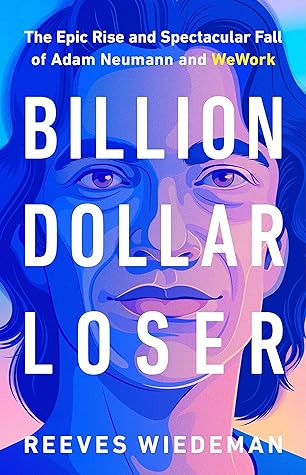More on this book
Community
Kindle Notes & Highlights
Read between
December 25, 2021 - September 22, 2022
Wintroub lived and worked on the West Coast, and had made it a mission to help JPMorgan become more involved with young start-ups.
JPMorgan was still Manhattan’s largest private office
Lew Frankfort, the former CEO of Coach, who had invested in WeWork alongside JPMorgan and joined the company’s board of directors, gave a talk at a fire pit in front of a few hundred campers. Adam and Rebekah sat in the front row. Frankfort encouraged the assembled entrepreneurs to embrace single-mindedness, telling them to “never be captive to your employees” in the pursuit of your vision. “A drive for excellence and a fear of failure is a double-edged sword,” Frankfort said. “If you have it, embrace it.”
WeWork’s new general counsel, that gave him ten votes for each share of the company he owned. The arrangement would give him roughly 65 percent of the votes on any company matter. These “supervoting” shares had become popular in Silicon Valley, where founders feared losing control of their companies. Mark Zuckerberg had negotiated a similar deal, as had Travis Kalanick at Uber.
“The very act of dumping hundreds of millions of dollars into an immature private company can also have perverse effects on a company’s operating discipline,” Gurley wrote.
Sarbanes-Oxley Act of 2002, the federal law instituted in the wake of the Enron scandal to require greater accountability from public companies.
“SoftBank is now working to make people happy through the information revolution,” Masa said. “This is the single thing we want to accomplish.”
“Our valuation and size today are much more based on our energy and spirituality than it is on a multiple of revenue,” Adam said after the SoftBank deal closed.
“I want to have the biggest valuation I can, because when countries are shooting at each other, I want them to come to me,” Adam said during a conversation about the ongoing Syrian refugee crisis and how WeWork might help solve it.
For businesses without Warren Buffett’s “moat” protecting them,
In a final section, titled “Responsible Blitzscaling,” he said there was a difficult balance required “in marrying responsibility and velocity” and that while start-up founders “may benefit from behaving like ethical pirates, they should never behave like sociopathic criminals.”
The kind of rapid expansion that venture capital made possible wasn’t sustainable without discipline. In the middle of the decade, Benioff had issued a warning: “There’s going to be a lot of dead unicorns.”
The number was unreasonable, but the lesson from Adam’s early fundraising days had stuck. “Adam would put $100 billion in the deck so he would end up getting $1 billion,” a person involved in the fund said. “You shoot for the moon and land higher than anyone else.”
“That cult kind of vibe is absolutely true,” Contreras said. “They don’t force you to do things, but the energy is so strong you just go with it.”
“Then we can go to any minority, and anyone who is weaker, who is getting taken advantage of by someone who is more powerful,”
Kutcher had more or less given up acting since taking on the role of Steve Jobs in a 2013 biopic and was now running a venture capital firm called Sound Ventures along with Guy Oseary, the impresario best known for being Madonna’s manager.
“Let’s say it trades down to a $5 billion valuation,” Schwartz said, throwing out a number more in line with where the London Stock Exchange valued IWG. “Employees will suffer. Investors take a bath. But Adam’s still worth a billion. So from an objective perspective, was it a mistake to play this long con and take on this hemorrhage-inducing risk? You could argue that was the rational mode.”
“The reason I care is that if the most successful companies are the ones that just drive really hard, and play fast and loose with the truth,” Schwartz said, “then maybe the whole idea that capitalism is great, or even useful, is really challenging to uphold.”
IN ADDITION TO explaining how a company makes money, a critical part of any S-1 is to offer an explanation for how a company operates, and what controls are in place to assure investors that a steady hand is at the wheel.


